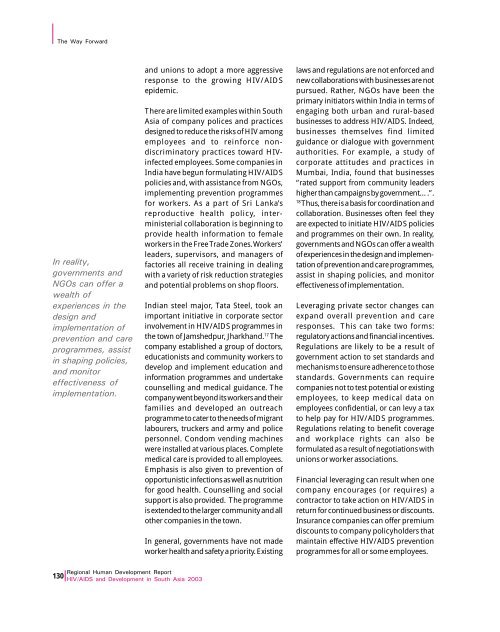Download Report - UNDP Asia-Pacific Regional Centre - United ...
Download Report - UNDP Asia-Pacific Regional Centre - United ...
Download Report - UNDP Asia-Pacific Regional Centre - United ...
You also want an ePaper? Increase the reach of your titles
YUMPU automatically turns print PDFs into web optimized ePapers that Google loves.
The Way orwardIn reality,governments andNGOs can offer awealth ofexperiences in thedesign andimplementation ofprevention and careprogrammes, assistin shaping policies,and monitoreffectiveness ofimplementation.and unions to adopt a more aggressiveresponse to the growing HIV/AIDSepidemic.There are limited examples within South<strong>Asia</strong> of company polices and practicesdesigned to reduce the risks of HIV amongemployees and to reinforce nondiscriminatorypractices toward HIVinfectedemployees. Some companies inIndia have begun formulating HIV/AIDSpolicies and, with assistance from NGOs,implementing prevention programmesfor workers. As a part of Sri Lanka’sreproductive health policy, interministerialcollaboration is beginning toprovide health information to femaleworkers in the Free Trade Zones. Workers’leaders, supervisors, and managers offactories all receive training in dealingwith a variety of risk reduction strategiesand potential problems on shop floors.Indian steel major, Tata Steel, took animportant initiative in corporate sectorinvolvement in HIV/AIDS programmes inthe town of Jamshedpur, Jharkhand. 17 Thecompany established a group of doctors,educationists and community workers todevelop and implement education andinformation programmes and undertakecounselling and medical guidance. Thecompany went beyond its workers and theirfamilies and developed an outreachprogramme to cater to the needs of migrantlabourers, truckers and army and policepersonnel. Condom vending machineswere installed at various places. Completemedical care is provided to all employees.Emphasis is also given to prevention ofopportunistic infections as well as nutritionfor good health. Counselling and socialsupport is also provided. The programmeis extended to the larger community and allother companies in the town.In general, governments have not madeworker health and safety a priority. Existinglaws and regulations are not enforced andnew collaborations with businesses are notpursued. Rather, NGOs have been theprimary initiators within India in terms ofengaging both urban and rural-basedbusinesses to address HIV/AIDS. Indeed,businesses themselves find limitedguidance or dialogue with governmentauthorities. For example, a study ofcorporate attitudes and practices inMumbai, India, found that businesses“rated support from community leadershigher than campaigns by government….”.18Thus, there is a basis for coordination andcollaboration. Businesses often feel theyare expected to initiate HIV/AIDS policiesand programmes on their own. In reality,governments and NGOs can offer a wealthof experiences in the design and implementationof prevention and care programmes,assist in shaping policies, and monitoreffectiveness of implementation.Leveraging private sector changes canexpand overall prevention and careresponses. This can take two forms:regulatory actions and financial incentives.Regulations are likely to be a result ofgovernment action to set standards andmechanisms to ensure adherence to thosestandards. Governments can requirecompanies not to test potential or existingemployees, to keep medical data onemployees confidential, or can levy a taxto help pay for HIV/AIDS programmes.Regulations relating to benefit coverageand workplace rights can also beformulated as a result of negotiations withunions or worker associations.Financial leveraging can result when onecompany encourages (or requires) acontractor to take action on HIV/AIDS inreturn for continued business or discounts.Insurance companies can offer premiumdiscounts to company policyholders thatmaintain effective HIV/AIDS preventionprogrammes for all or some employees.<strong>Regional</strong> Human Development <strong>Report</strong>130 HIV/AIDS and Development in South <strong>Asia</strong> 2003
















